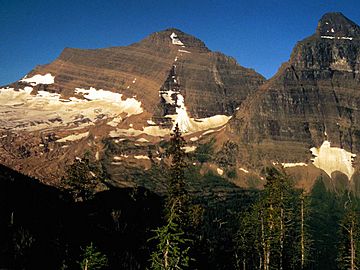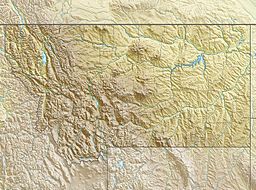Livingston Range facts for kids
Quick facts for kids Livingston Range |
|
|---|---|

Kintla Peak
|
|
| Highest point | |
| Peak | Kintla Peak |
| Elevation | 10,101 ft (3,079 m) |
| Dimensions | |
| Length | 36 mi (58 km) |
| Width | 28 mi (45 km) |
| Geography | |
| Countries | United States and Canada |
| Parent range | Rocky Mountains |
| Geology | |
| Orogeny | Lewis Overthrust |
The Livingston Range is a beautiful mountain range found mostly in Glacier National Park. This park is in the U.S. state of Montana. A small part of the range also stretches into British Columbia, a province in Canada.
This mountain range is about 36 miles (58 km) long. It is also about 28 miles (45 km) wide. Many of its peaks are very tall. Over 15 mountains here are higher than 9,000 feet (2,743 meters). The very highest point is Kintla Peak. It stands at 10,101 feet (3,079 meters) tall. Even though these mountains are not the highest in North America, they rise dramatically from the valleys below. This makes them look very impressive!
How the Livingston Range Was Formed
The Livingston Range started to form a very long time ago. This was about 170 million years ago. A huge geological event called the Lewis Overthrust happened.
Imagine a giant push! A massive slab of very old rocks was pushed. This rock slab was about 3 miles (5 km) thick. It was also 50 miles (80 km) wide and 160 miles (257 km) long. This huge piece of rock slid over much newer rocks. This powerful movement created the mountains we see today.
 | Frances Mary Albrier |
 | Whitney Young |
 | Muhammad Ali |



